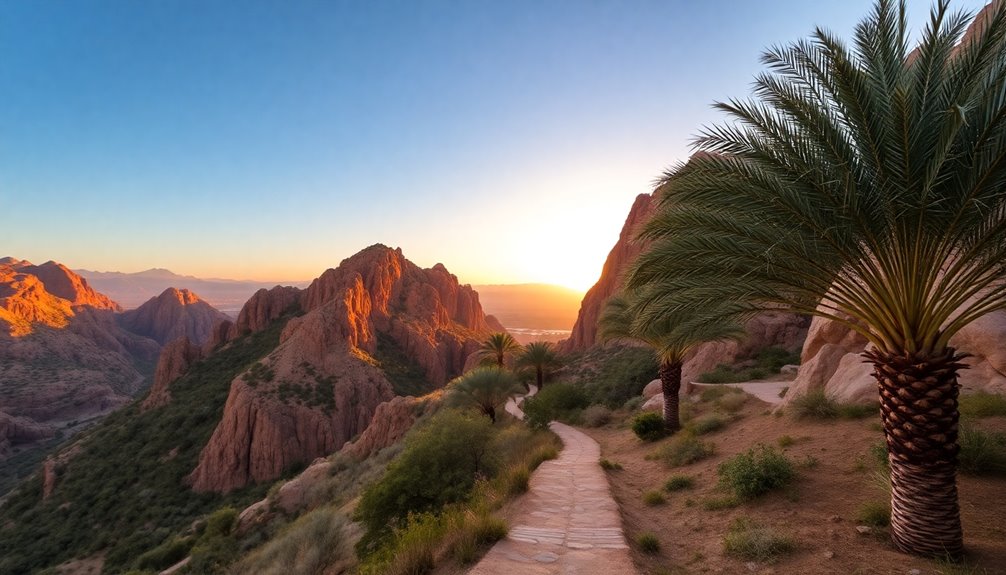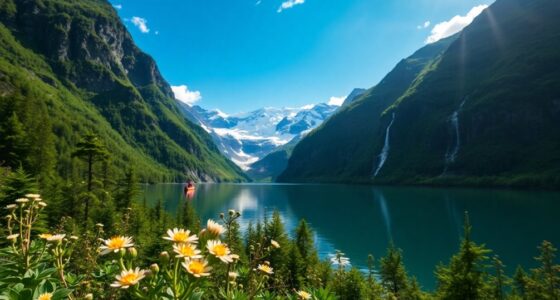If you're looking to discover nature and heritage sustainably, Oman is the perfect destination. You can explore diverse ecosystems, from the coastal nesting turtles at Ras Al Hadd to the enchanting Hajar Mountains. Fly directly from Dubai, and choose eco-friendly transport options like electric buses or bike paths. Participate in community-led reforestation projects that support local livelihoods. The spring months offer mild weather for outdoor adventures while celebrating Oman's rich culture. By choosing responsible practices, you can contribute to sustainability efforts. There's so much more to uncover about eco-friendly travels in Oman waiting for you.
Key Takeaways
- Explore Oman's diverse ecosystems, from the Arabian Sea to the Hajar Mountains, while promoting biodiversity conservation and supporting local initiatives.
- Utilize eco-friendly accommodations and transportation options, such as electric buses and shared mobility solutions, to minimize your environmental impact.
- Engage in sustainable outdoor activities like hiking and wildlife observation, which respect local habitats and educate visitors about endangered species.
- Participate in community-led reforestation projects and support local artisans to enhance livelihoods and preserve Oman's cultural heritage.
- Follow responsible tourism practices, such as the Leave No Trace principles, to ensure a positive impact on Oman's natural and cultural landscapes.
Introduction
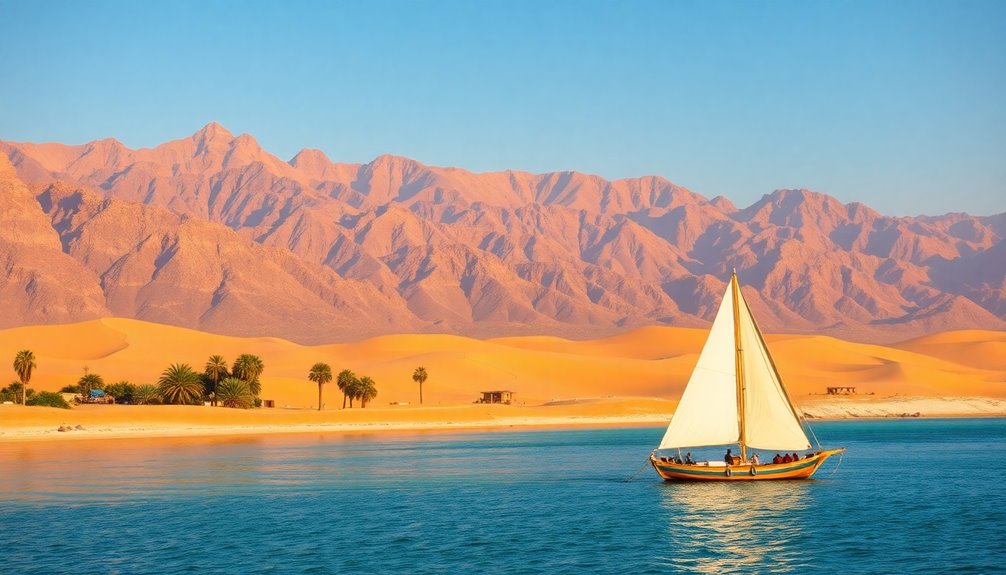
Oman's diverse ecosystems and stunning landscapes offer a glimpse into the country's commitment to preserving its unique biodiversity.
As you explore its deserts, mountains, and beaches, you'll see how these environments support a rich variety of flora and fauna.
Understanding this connection is essential for appreciating Oman's eco-friendly initiatives and sustainable practices.
Oman's Diverse Ecosystems and Landscapes
Nestled between the Arabian Sea and the Rub' al Khali desert, Oman showcases an incredible variety of ecosystems and landscapes that captivate all who visit.
From the majestic mountains to serene beaches and lush oases, each environment supports unique ecosystems that thrive in harmony.
You'll discover 99 mammal species, including the endangered Arabian oryx and leopard, reflecting Oman's commitment to sustainable practices in wildlife conservation.
Coastal regions teem with vibrant marine life, as Ras Al Hadd becomes a crucial nesting site for around 30,000 turtles.
With 1,212 documented plant species, 87% being endemic, and the striking Al-Jarz's rosy lakes showcasing rich diversity, Oman's ecological richness is a treasure waiting to be explored responsibly.
Preserve Oman's Unique Biodiversity
While exploring the breathtaking landscapes of Oman, you'll encounter a treasure trove of unique biodiversity that deserves protection.
With 99 mammal species, including the endangered Arabian oryx and leopard, Oman's wildlife is remarkable. Coastal habitats thrive with marine life, from nesting green turtles to playful dolphins.
The diverse plant life, featuring 1212 species, showcases a significant portion that's endemic to the region. However, habitat loss and climate change threaten these ecosystems.
By embracing sustainable tourism practices, you can contribute to preserving this invaluable biodiversity. Supporting local conservation initiatives and respecting nature helps ensure that future generations can enjoy Oman's rich flora and fauna.
Together, we can protect the unique biodiversity that makes this country truly special.
Travel From Dubai to Destination
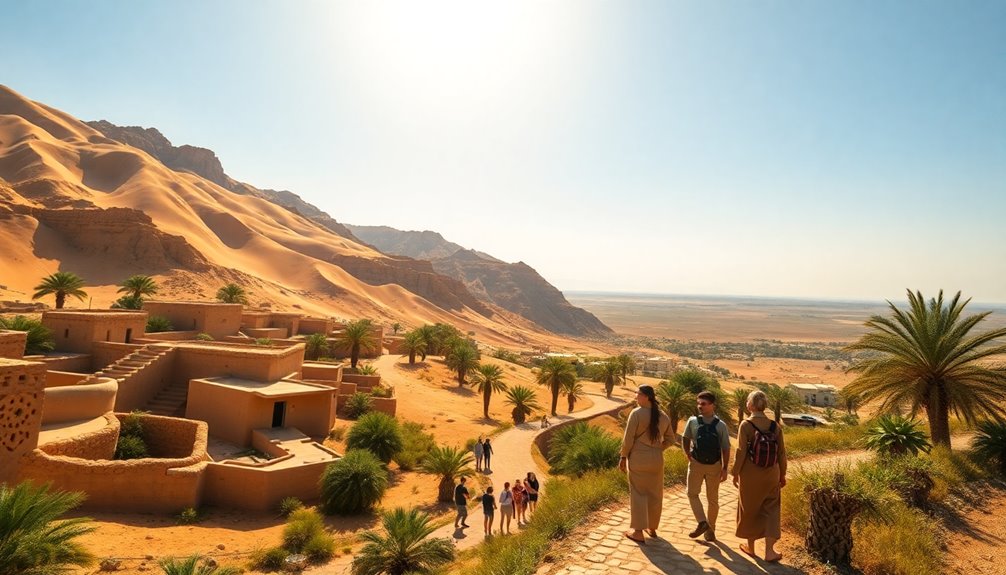
When you're planning your trip from Dubai to Oman, you've got a few convenient options.
You can fly directly or consider traveling via London for a different experience.
If you prefer a scenic route, public buses and shared taxis offer a great way to soak in the stunning landscapes along the way.
Fly Directly to Oman
If you're looking for a quick escape, direct flights from Dubai to Oman make it easy to dive into the country's stunning landscapes and rich culture.
With just a 1 to 1.5-hour flight, you can reach vibrant destinations like Muscat and Salalah. Both Oman International Airport and Salalah Airport offer modern facilities, ensuring a seamless travel experience.
Upon arrival, you'll discover Oman's commitment to sustainable tourism, featuring unique eco-friendly accommodations and conservation initiatives.
This encourages you to explore the diverse landscapes, from breathtaking desert dunes to lush mountains, while engaging in responsible travel.
Travel via London to Oman
For those traveling from London to Oman, the journey often includes a convenient stopover in Dubai. This route typically takes about 12-15 hours, thanks to major airlines like Oman Air and Emirates.
Dubai International Airport serves as a key hub for flights to Muscat and other Omani cities.
While en route, consider these sustainable travel tips:
- Choose eco-friendly accommodations in Oman to support sustainable development.
- Explore natural sites like Ras Al Hadd Nature Reserve, promoting environmental sustainability.
- Engage in local cultural experiences that respect and preserve Oman's heritage. Additionally, utilizing energy-efficient models can make your stay more sustainable by reducing your environmental footprint.
Fly From Sydney to Oman
Flying from Sydney to Oman is a seamless journey that often starts with a direct flight to Dubai on Emirates, which operates daily services.
After landing in Dubai, you can hop on a short connecting flight to Muscat, taking just about an hour.
With Muscat International Airport as your gateway, you're only a quick drive away from stunning destinations like Yiti and Salalah, where you can immerse yourself in Oman's natural beauty.
Australian citizens can easily obtain a tourist visa online or upon arrival, making entry into Oman hassle-free.
Once you're there, consider staying at eco-friendly accommodations that promote sustainable practices, enhancing your experience of the rich culture and breathtaking landscapes Oman has to offer. Additionally, using renewable wood fuel for heating in your accommodations can further support eco-friendly living during your stay.
Public Buses and Shared Taxis
Traveling from Dubai to Oman offers several economical and eco-friendly options, with public buses and shared taxis being popular choices among visitors.
Public transportation not only reduces your travel costs but also supports sustainable travel practices.
Here are some benefits of choosing these options:
- Cost-effective: Buses and shared taxis are affordable, making them ideal for budget travelers.
- Comfort and safety: Modern buses and taxis prioritize passenger comfort and adhere to safety standards.
- Scenic views: Enjoy the captivating desert landscapes during your 5-6 hour bus journey to Muscat.
Sustainable Desert Adventures

When you explore Oman's stunning deserts, you can enjoy eco-conscious wildlife encounters and sustainable hiking that respects the environment.
Opt for birdwatching tours that enhance your appreciation of the region's diverse species while promoting conservation efforts.
Plus, you'll find sustainable lodging options that let you relax without compromising your commitment to eco-friendly travel.
Eco-Conscious Wildlife Encounters
Exploring Oman's vast deserts offers not just breathtaking landscapes but also a chance to connect with its incredible wildlife in a sustainable way.
By engaging in eco-conscious wildlife encounters, you'll help protect biodiversity while enjoying the unique desert ecosystem.
Consider these aspects of responsible tourism:
- Guided tours educate you about the Arabian oryx and endangered Arabian leopard.
- Minimizing vehicle use and sticking to designated paths preserves delicate habitats.
- Eco-friendly lodges utilize renewable energy, reducing environmental impact.
Through your travels, you can empower local communities, enabling them to share traditional knowledge about wildlife and ecosystems.
This fosters a deeper connection between you and nature, ensuring that your adventures support conservation efforts and promote sustainable practices in Oman's beautiful deserts.
Sustainable Hiking and Birdwatching
Oman's breathtaking landscapes invite you to experience the thrill of sustainable hiking and birdwatching, complementing your eco-conscious wildlife encounters.
With diverse trails winding through the Hajar Mountains and along stunning coastal paths, you'll explore the natural beauty while minimizing your environmental impact.
Birdwatching here is equally rewarding; over 400 bird species, including migratory ones, make Oman a prime destination for enthusiasts eager to observe unique avian life in their habitats.
Local guides lead sustainable desert adventures, emphasizing Leave No Trace principles to protect the delicate ecosystem.
Engaging with community-based tourism, you'll learn about traditional practices and local biodiversity, fostering a deeper connection to the environment while supporting sustainable livelihoods.
Enjoy nature responsibly in this enchanting landscape!
Sustainable Lodging Options Available
While you venture into the enchanting deserts of Oman, you'll find a variety of sustainable lodging options that enhance your eco-friendly experience.
These accommodations not only prioritize energy efficiency but also celebrate Omani culture through traditional architecture. Staying in eco-friendly resorts allows you to directly support local economies and conservation efforts.
- Solar-powered camps that minimize environmental impact
- Waste reduction initiatives, including composting and recycling
- Opportunities for engaging in environmental conservation activities
Eco-Friendly Transportation Options Available

Yiti offers a robust public transportation network, prioritizing eco-friendly options that align with sustainable tourism. You can take advantage of electric buses and shared mobility solutions, both designed to provide low-emission alternatives for getting around.
If you prefer a more active approach, the city features dedicated bicycle lanes and pedestrian pathways, encouraging non-motorized transport. You'll also find car-sharing options and electric vehicle charging stations throughout Yiti, making it easy to use eco-friendly vehicles.
Plus, renewable energy sources like solar and wind power the public transport systems, further reducing emissions. Many smart cities, including those focused on sustainability, are increasingly adopting smart utilities for home to enhance energy efficiency and reduce environmental impact.
Embrace these options for a greener, more sustainable travel experience in Yiti!
Community-Led Reforestation Projects
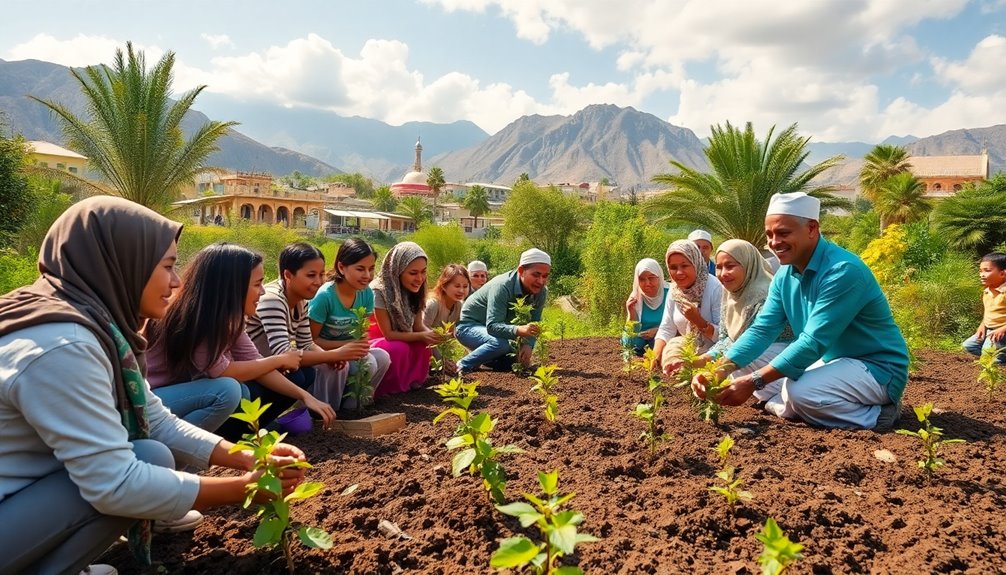
Community-led reforestation projects in Oman are transforming local landscapes while empowering residents.
You'll see how the government and NGOs work closely with communities to promote sustainable practices that benefit both the environment and cultural heritage.
Together, they're not just planting trees; they're nurturing a greener future for everyone.
Government and NGO Efforts
Oman's government, in partnership with various NGOs, has launched impressive community-led reforestation projects that aim to revive native plant species and boost biodiversity across the nation.
By engaging local communities, these initiatives foster cultural preservation and economic development while combating desertification.
- Over 1 million trees have been planted, focusing on endemic species.
- Local residents receive training and support to sustain these efforts.
- Enhanced local livelihoods arise through eco-tourism opportunities.
These partnerships ensure a commitment to environmental conservation, allowing you to witness the positive impact on air quality and the ecosystem.
As you participate in these community efforts, you'll contribute to a healthier planet and a vibrant Omani heritage that thrives sustainably.
Community and Cultural Sustainability
Local communities play a vital role in the success of reforestation projects in Oman, actively participating in efforts to restore and enhance their ecosystems. Through community-led reforestation, residents engage in tree planting and habitat restoration, fostering a sense of ownership over their natural environment.
These initiatives not only conserve biodiversity and combat desertification but also link with traditional Omani practices, integrating cultural heritage with environmental stewardship. Educational programs highlight the importance of trees for carbon sequestration and soil conservation, promoting sustainable land use.
Collaborating with local organizations and international partners amplifies these efforts, creating sustainable livelihoods through eco-tourism and the sale of sustainably sourced products, all while preserving cultural integrity and strengthening community ties.
Spring for Mild Weather

Spring's the perfect time to visit Oman, with mild temperatures ranging from 20°C to 30°C.
You'll enjoy the seasonal rainfall that brings vibrant wildflowers and lush landscapes, especially in places like Salalah.
This inviting weather makes it ideal for outdoor adventures and eco-tourism activities.
Optimal Months for Visiting
March through May is the perfect time to visit Oman if you're looking for mild weather and stunning landscapes. With temperatures ranging from 20°C to 30°C, you can fully enjoy the natural and cultural wonders of this beautiful country.
Spring offers vibrant wildflowers and lush greenery, particularly in Salalah.
During this season, consider:
- Hiking in the Hajar Mountains for breathtaking views
- Visiting Ras Al Hadd for wildlife observation
- Experiencing local cultural festivals that showcase Oman's heritage
Fewer tourists during spring means you can explore sustainably, immersing yourself in Oman's treasures without the crowds.
Seasonal Rainfall Patterns
While you're enjoying the mild weather in Oman, you'll likely notice that the spring months bring seasonal rainfall, which significantly enhances the country's vibrant landscapes.
From March to May, this rain nurtures diverse flora, making the scenery even more breathtaking. With areas like Salalah receiving over 700 mm, the economic benefits are clear—replenishing groundwater for agriculture and supporting local ecosystems.
This seasonal pattern doesn't just boast a cultural revival, as wildflowers bloom and green spaces flourish; it also invites eco-tourism, allowing you to explore Oman's natural gems comfortably.
You'll find that the combination of milder weather and rainfall creates an ideal setting for outdoor activities, connecting you more deeply with Oman's unique biodiversity and heritage.
How to Make Your Trip More Sustainable
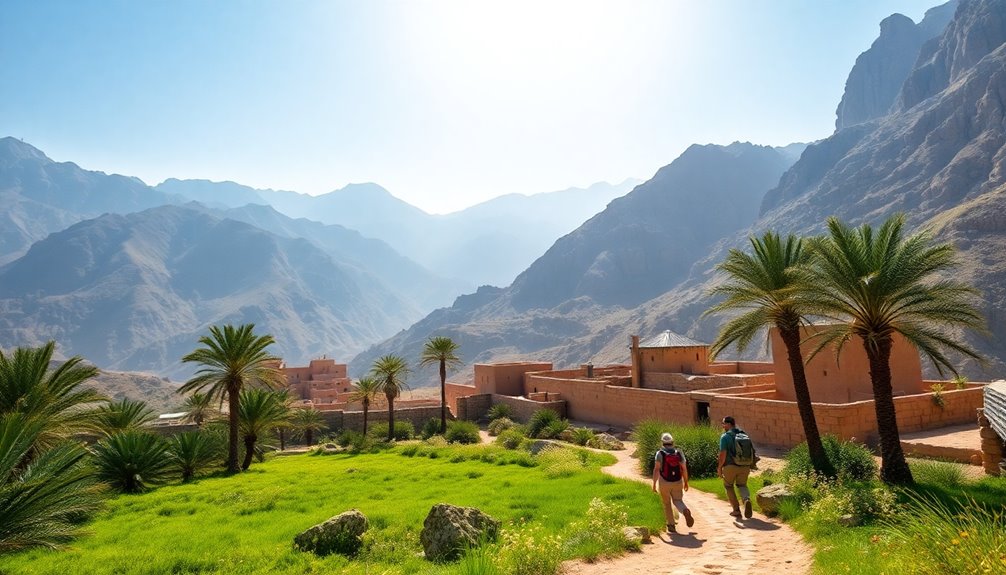
When you're packing for your trip to Oman, consider bringing reusable containers for snacks to cut down on waste.
Supporting local artisans by purchasing their crafts not only helps the community but also gives you a unique souvenir.
These simple choices make your journey more sustainable and enrich your travel experience.
Reusable Containers for Snacks
Using reusable containers for snacks is a simple yet impactful way to make your trip to Oman more sustainable. By choosing this eco-friendly option, you'll help reduce single-use plastic waste, which is vital for preserving Oman's unique ecosystems and rich marine life.
Here are some benefits of using reusable containers:
- Minimizes litter in natural areas, supporting environmental conservation efforts.
- Aligns with sustainable practices encouraged by eco-friendly resorts and lodges.
- Supports local initiatives aimed at reducing food packaging waste in popular destinations.
Engaging in sustainable practices like this not only enhances your travel experience but also shows respect for local cultures and environments, contributing to Oman's Vision 2040 for sustainable development. Additionally, adopting such habits can help in developing a strong emergency fund, ensuring you're prepared for unexpected expenses during your travels.
Support Local Artisans' Crafts
Supporting local artisans' crafts can significantly enhance your travel experience in Oman while promoting sustainability.
When you purchase handmade items, you're not just buying souvenirs; you're supporting local crafts and preserving traditional Omani craftsmanship. Engaging in workshops with artisans allows you to learn about their techniques, deepening your appreciation for Oman's rich culture.
This connection helps combat economic challenges faced by rural artisans, providing essential income for families. Many crafts, like pottery and silver jewelry, are made from eco-friendly materials, ensuring your purchases are environmentally conscious. By choosing locally made products over mass-produced items, you reduce your carbon footprint and contribute to the conservation of Oman's unique cultural and natural heritage.
Incorporating sustainable practices into your shopping not only supports the local economy but also aligns with eco-friendly consumer preferences.
Embrace the beauty of Omani craftsmanship and make a sustainable impact.
Frequently Asked Questions
Is Oman Environmentally Friendly?
Yes, Oman is environmentally friendly.
You've got a country that prioritizes sustainable development and biodiversity conservation. With initiatives like the Ministry of the Environment and eco-conscious tourism practices, Oman showcases a strong commitment to preserving its unique ecosystems.
You'll find green technologies integrated into urban planning and accommodations that promote responsible tourism.
What Is the Major Challenge for Sustainable Development in Oman?
Imagine a ship sailing through turbulent seas, struggling against strong winds. That's Oman facing its major challenge for sustainable development.
The heavy reliance on oil is like an anchor weighing it down, limiting progress in diversifying its economy. Water scarcity adds to the storm, threatening agriculture and urban growth.
As you navigate through these issues, you'll see the urgent need for education and awareness to guide Oman toward calmer waters and a sustainable future.
What Does Oman Do to the Environment They Live In?
Oman takes significant steps to protect its environment.
You'll find the country implementing comprehensive environmental laws through its Ministry of the Environment, which plays a key role in ecosystem preservation.
The Sultan Qaboos Prize highlights efforts in conservation, showcasing the government's commitment.
With rich biodiversity, including unique mammals and endemic plant species, Oman collaborates with international organizations to tackle environmental challenges and promote sustainable development, ensuring its natural heritage thrives for future generations.
What Conservation Projects Are Happening in Oman?
In Oman, you'll find several impressive conservation projects.
The Ras Al Hadd Nature Reserve protects nesting grounds for over 30,000 turtles, while the Oman Botanic Garden preserves unique plant diversity, featuring over 1,400 species.
You can also appreciate the Sultan Qaboos Prize for Environmental Preservation, which encourages sustainable practices.
Additionally, local universities collaborate on research programs, focusing on wildlife habitat protection and promoting eco-friendly initiatives across the country.
Conclusion
As you wander through Oman's breathtaking landscapes, remember that every footprint you leave in the sand symbolizes your commitment to sustainability. By embracing eco-friendly practices, you're not just exploring a rich heritage; you're planting seeds of change for future generations. Let the vibrant flora and fauna remind you of our interconnectedness, urging you to tread lightly. Your journey doesn't just enrich your soul—it nurtures the earth, ensuring that Oman's beauty thrives long after you've returned home.

